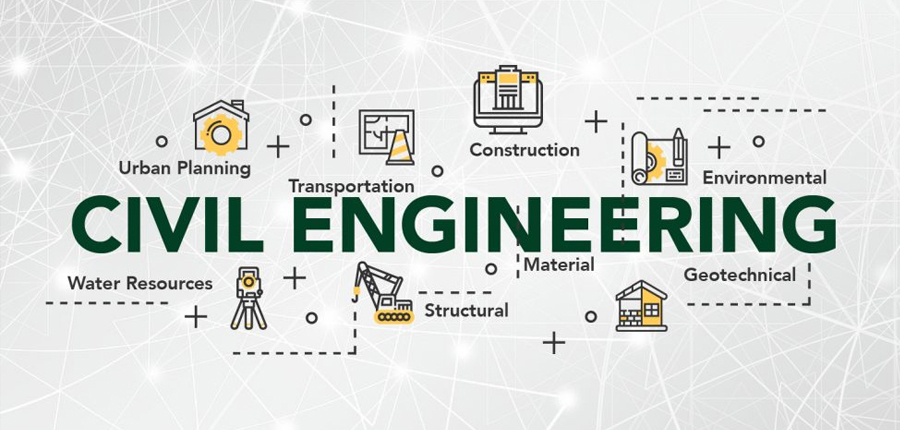Civil Engineering Careers: Opportunities and Pathways
Civil engineering is a diverse and dynamic field that plays a crucial role in shaping the infrastructure and environment of our world. From designing bridges and highways to managing water resources and constructing buildings, civil engineers tackle complex challenges that impact daily life. This comprehensive guide explores the various career opportunities within civil engineering, the skills required, and the future outlook for professionals in this field.
The Role of Civil Engineers
Civil engineers are responsible for planning, designing, constructing, and maintaining infrastructure projects. Their work ensures that critical systems and structures, such as roads, bridges, dams, and buildings, are safe, efficient, and sustainable. The scope of civil engineering is broad, encompassing several sub-disciplines:
- Structural Engineering: Focuses on designing and analyzing structures to ensure they can withstand loads and environmental forces. Structural engineers work on buildings, bridges, and other infrastructures.
- Geotechnical Engineering: Deals with the behaviour of soil and rock in construction. Geotechnical engineers assess ground conditions and design foundations and retaining structures.
- Transportation Engineering: Specializes in designing and managing transportation systems, including highways, railways, and airports. Transportation engineers work to improve traffic flow and safety.
- Environmental Engineering: Focuses on addressing environmental issues such as water and air pollution, waste management, and sustainable development. Environmental engineers design systems to protect and enhance natural resources.
- Water Resources Engineering: Involves managing and utilizing water resources for various purposes, including flood control, irrigation, and water supply. Water resources engineers design and oversee water infrastructure projects.
- Construction Engineering: Centers on the management and execution of construction projects. Construction engineers ensure that projects are completed on time, within budget, and according to specifications.
Educational Requirements
Becoming a civil engineer typically requires a solid educational foundation. Here are the key steps:
- Bachelor’s Degree: A Bachelor’s degree in civil engineering or a related field is essential. The curriculum usually includes mathematics, physics, materials science, and various civil engineering courses. Accreditation by the Accreditation Board for Engineering and Technology (ABET) is important for ensuring the quality of the program.
- Licensing: In many regions, civil engineers need to obtain a Professional Engineer (PE) license. This requires passing the Fundamentals of Engineering (FE) exam, gaining relevant work experience, and passing the PE exam.
- Master’s Degree (Optional): A Master’s degree can provide specialized knowledge and improve career prospects. It is particularly useful for those interested in advanced research or management positions.
- Continuing Education: Civil engineers often engage in continuing education to stay current with technological advancements and industry standards. Professional development courses and certifications can enhance expertise and career opportunities.

Career Pathways and Opportunities
Civil engineering offers a wide range of career pathways, each with its own set of opportunities and challenges. Here are some prominent career options within the field:
1. Structural Engineer
Responsibilities: Structural engineers design and analyze structural systems to ensure they can support loads and resist environmental forces. They work on projects like bridges, skyscrapers, and stadiums.
Career Outlook: The demand for structural engineers is strong due to the ongoing need for infrastructure development and maintenance. Professionals in this field can work for engineering firms, government agencies, or as independent consultants.
Skills Required: Strong analytical skills, proficiency in structural analysis software, and a deep understanding of materials and design principles.
2. Geotechnical Engineer
Responsibilities: Geotechnical engineers study soil and rock behaviour to design foundations, retaining walls, and other structures that interact with the ground. They conduct site investigations and analyze soil samples.
Career Outlook: Geotechnical engineering is a specialized field with steady demand, especially in areas with complex geological conditions. Opportunities exist in both private industry and government.
Skills Required: Knowledge of soil mechanics, strong analytical skills, and experience with geotechnical software and testing methods.
3. Transportation Engineer
Responsibilities: Transportation engineers design and manage transportation systems to improve mobility and safety. They work on projects like highways, railways, airports, and public transit systems.
Career Outlook: With growing urbanization and infrastructure needs, transportation engineers are in high demand. This field offers opportunities in both public sector agencies and private consulting firms.
Skills Required: Understanding of traffic engineering principles, proficiency in transportation modelling software, and project management skills.
4. Environmental Engineer
Responsibilities: Environmental engineers develop solutions to environmental challenges such as pollution control, waste management, and sustainable development. They design systems to protect natural resources and improve environmental quality.
Career Outlook: The increasing focus on sustainability and environmental protection drives demand for environmental engineers. They can work for government agencies, private firms, or non-profit organizations.
Skills Required: Knowledge of environmental regulations, experience with environmental impact assessments, and strong problem-solving skills.
5. Water Resources Engineer
Responsibilities: Water resources engineers manage and design systems for water supply, flood control, and irrigation. They work on projects such as dams, reservoirs, and water treatment facilities.
Career Outlook: Water resources engineering is crucial in addressing water scarcity and managing water-related risks. Opportunities are available in both the public and private sectors.
Skills Required: Expertise in hydrology and hydraulics, experience with water modelling software, and strong analytical skills.
6. Construction Engineer
Responsibilities: Construction engineers oversee the construction process, ensuring projects are completed on time, within budget, and according to specifications. They manage construction teams, resources, and schedules.
Career Outlook: With the continuous need for new infrastructure and renovation projects, construction engineers are in demand. They can work for construction firms, engineering companies, or as project managers.
Skills Required: Strong project management skills, knowledge of construction methods and materials, and effective communication skills.
Electrical Engineering Careers: Exploring Opportunities and Paths
Professional Development and Specializations
Civil engineering offers various opportunities for specialization and career advancement. Professionals can pursue certifications and advanced degrees to enhance their expertise and open new career doors. Some areas of specialization include:
- Project Management: Civil engineers can become project managers, overseeing large-scale projects from inception to completion. Certification programs such as Project Management Professional (PMP) can be beneficial.
- Sustainability and Green Building: With a growing emphasis on sustainable construction practices, civil engineers can specialize in green building design and environmental impact reduction.
- Urban Planning: Civil engineers interested in urban development can transition into urban planning, focusing on designing and improving city infrastructure and services.
- Research and Academia: For those interested in research and teaching, pursuing a PhD and engaging in academic research can lead to roles in universities and research institutions.
Challenges in Civil Engineering
While civil engineering offers numerous opportunities, it also comes with its set of challenges:
- Complex Projects: Civil engineering projects are often complex and require coordination between multiple stakeholders, including clients, contractors, and regulatory agencies.
- Regulatory Compliance: Engineers must navigate various regulations and standards, which can vary by region and project type.
- Environmental Concerns: Addressing environmental impacts and ensuring sustainability are ongoing challenges in civil engineering.
- Technological Changes: Staying current with technological advancements and integrating new tools and techniques can be demanding.
Future Trends and Opportunities
The field of civil engineering is evolving rapidly, influenced by technological advancements and changing societal needs. Some key trends and opportunities include:
- Smart Infrastructure: The integration of technology into infrastructure, such as smart grids and intelligent transportation systems, is transforming the field. Civil engineers will need to adapt to these innovations.
- Sustainable Development: There is a growing emphasis on sustainable practices and green building techniques. Civil engineers will play a critical role in developing eco-friendly infrastructure.
- Resilience and Climate Adaptation: As climate change impacts become more apparent, civil engineers will focus on designing resilient infrastructure that can withstand extreme weather events and environmental changes.
- Advanced Materials and Construction Techniques: Innovations in materials and construction methods, such as 3D printing and prefabrication, are reshaping the industry and creating new opportunities for civil engineers.
Civil engineering is a vital and diverse field with a wide range of career opportunities. From designing and constructing infrastructure to addressing environmental challenges, civil engineers play a crucial role in shaping the world we live in. By pursuing the right education, gaining relevant experience, and staying current with industry trends, aspiring civil engineers can build successful and fulfilling careers. As the field continues to evolve, civil engineers will have the opportunity to contribute to innovative solutions and make a lasting impact on society.





Post Comment